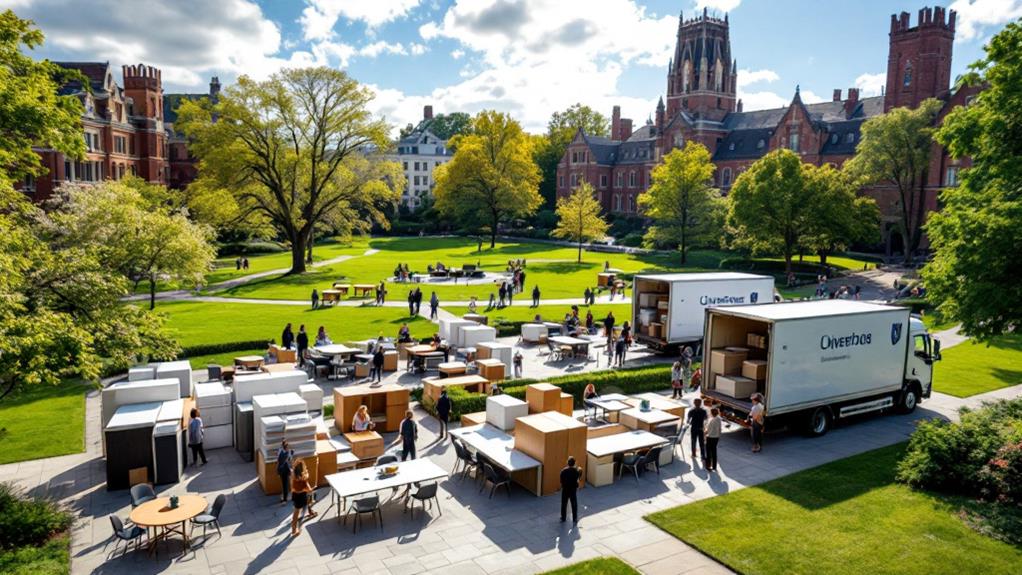When buying large quantities of furniture for universities, consider the numerous advantages like bulk discounts, which can reduce costs by 20-50% compared to retail prices. Direct sourcing from manufacturers simplifies logistics, bypassing intermediaries and minimizing lead times. Diverse furniture selections cater to both functional and aesthetic needs, while customization options allow for unique specifications that align with institutional goals. Efficient delivery services, paired with strategic inventory management, further streamline the process. Emphasize eco-friendly choices to reflect sustainable practices. Flexible payment solutions ease budget pressures, making large acquisitions manageable. Uncover more about optimizing your university's furniture procurement process.
Cost Savings on Bulk Purchases

Purchasing furniture in bulk is a smart strategy for universities looking to save costs. When you buy in large quantities, you can benefit from substantial cost reductions, often between 20-50% compared to retail rates. This is primarily because you're sourcing directly from manufacturers, which eliminates middlemen and reduces markup costs.
Additionally, bulk purchasing discounts make it easier for universities to manage their budgets effectively. By doing so, you not only save money but also gain access to high-quality, durable furniture that can withstand the demands of a busy campus environment.
Moreover, bulk purchases allow you to negotiate better pricing terms. With the ability to negotiate, universities can guarantee they stay within budget while acquiring the necessary furniture to outfit multiple buildings or facilities simultaneously. This negotiation power is a vital aspect of cost savings, providing flexibility in how funds are allocated across various needs.
Standardizing furniture across campus is another advantage, as it creates a cohesive aesthetic and maximizes savings through economies of scale.
Exploring Bulk Order Discounts
Building on the cost-saving advantages of bulk purchases, exploring bulk order discounts takes these benefits a step further. By leveraging tiered pricing from wholesale furniture suppliers, universities can dramatically cut costs. The concept is straightforward: the more units you order, the bigger the discount per item. This pricing model is especially advantageous for large-scale furnishing projects in classrooms, dormitories, and common areas, making it a budget-friendly approach.
Beyond just reducing the price per item, bulk orders often come with additional perks. Shipping fees, which can add up quickly, are frequently reduced or waived altogether for large orders. This means universities don't just save on furniture costs but also on the associated expenses of getting the items to campus.
Furthermore, many suppliers are open to negotiating extra benefits, like extended warranties and complimentary assembly services, which further enhance the value of your purchase.
Customizing furniture to meet specific institutional needs is another benefit frequently incorporated into bulk order agreements. This guarantees that the furniture not only fits budget constraints but also aligns with the university's functional requirements, making bulk order discounts a strategic choice for efficient campus outfitting.
Diverse Furniture Selection

When it comes to furnishing university spaces, a diverse furniture selection is key to meeting the varied needs of each setting—be it classrooms, dormitories, or common areas.
A wide array of styles and designs offered by wholesale suppliers guarantees you can choose pieces that align with your university's functional and aesthetic goals. Such diversity is crucial because different spaces have unique requirements, whether it's the durability for high-traffic areas or the comfort needed in study lounges.
Consider these factors when selecting furniture for your campus:
- Versatility: Choose pieces that serve multiple purposes, maximizing utility in flexible spaces.
- Sustainability: Opt for eco-friendly options that reflect your commitment to environmental responsibility.
- Cost-effectiveness: Leverage bulk purchasing discounts to furnish large areas economically.
- Durability: Confirm the furniture can withstand the demands of a university environment.
- Fast delivery: Select suppliers known for quick turnaround to meet tight renovation schedules.
Customization Options for Universities
Exploring customization options adds another layer of personalization to your diverse furniture selection. Universities can greatly benefit from extensive customization, tailoring their furniture designs to meet the specific needs and branding of various departments or facilities.
Many wholesale suppliers offer bespoke orders, allowing you to collaborate on unique specifications such as color schemes, materials, and dimensions. This flexibility guarantees that your furniture aligns with both aesthetic and functional requirements.
Customization can extend to ergonomic designs, particularly essential in study areas and communal spaces. Ergonomic furniture promotes student comfort and wellness, enhancing the overall learning environment.
By providing tailored solutions, you can create inviting and functional spaces that boost student engagement and satisfaction.
However, it's crucial to acknowledge that minimum order quantities for custom items often apply. This means you'll need to strategically plan your purchases to meet budgetary constraints while still achieving the desired customization.
The flexibility in design offered by suppliers allows for differentiation of facilities across campus, helping to create a unique identity for each department.
Ultimately, this approach can lead to higher student satisfaction and a more cohesive campus identity, aligning with your institution's goals and values.
Efficient Delivery and Logistics

Timely delivery is essential when furnishing university campuses, guaranteeing that new or renovated spaces are ready for use without delay. Efficient logistics systems play an important role in achieving this goal. By receiving large furniture orders promptly, universities can minimize downtime during renovations or expansions.
Direct fulfillment from manufacturers is a strategic approach that greatly reduces lead times, helping universities meet tight deadlines, especially at the start of academic semesters.
Partnering with reliable shipping carriers is another significant aspect. This collaboration guarantees timely delivery to multiple campus locations, enhancing satisfaction with the procurement process. Clear communication regarding shipping timelines and costs is also critical, allowing you to manage budgets and project planning effectively.
In order to streamline the setup process, consider these options:
- Direct fulfillment from manufacturers
- Reliable shipping carriers for multiple locations
- Clear communication on shipping timelines and costs
- Self-assembly options for flexibility
- Professional assembly services for convenience
Offering both self-assembly and professional assembly services can further streamline large-scale furniture installations, making the entire process more convenient for universities. By focusing on these logistics strategies, you can guarantee that the delivery and setup phases are efficient and aligned with your institution's needs.
Streamlined Order Fulfillment
Leveraging direct manufacturing partnerships, universities can streamline order fulfillment for large furniture purchases, guaranteeing reduced lead times and quicker delivery schedules.
By working directly with manufacturers, you can bypass intermediary delays, which often lead to inefficiencies. This direct approach not only speeds up production but also facilitates efficient logistics. Collaborating with reliable carriers guarantees that your bulk orders are delivered on time, a vital factor when outfitting campuses before the academic year begins.
Clear communication about shipping timelines and costs is essential. This transparency helps you manage your budget effectively, allowing for strategic planning around installation or assembly needs.
Many wholesale suppliers offer flexible delivery options, catering to your specific requirements. Whether you prefer self-assembly to reduce costs or professional services for convenience, there are solutions available.
Additionally, direct fulfillment minimizes inventory costs, enabling you to order furniture on an as-needed basis rather than maintaining large stockpiles. This approach reduces financial strain and storage needs, making the process more efficient.
Building Customer Trust

Streamlining order fulfillment not only enhances efficiency but also lays a foundation for building customer trust. When universities purchase furniture in bulk, they need assurance that their investment is protected. Transparent return policies, such as accepting returns only for manufacturing defects, provide this security, reinforcing the supplier's commitment to quality.
Additionally, offering clear warranty details reassures universities that they're safeguarded against potential issues, boosting their confidence in your products.
To foster trust further, consider the following strategies:
- Encourage online reviews from previous university clients, as positive feedback builds a trustworthy reputation.
- Address customer concerns promptly and effectively, demonstrating a commitment to satisfaction and long-term relationships.
- Highlight sustainable practices, using recycled or sustainably sourced materials to appeal to universities' interest in environmental responsibility.
- Clearly communicate warranty terms for bulk purchases, ensuring universities know they're protected.
- Maintain transparency in all transactions, ensuring universities understand every aspect of their purchase.
Effective Return Policies
A well-crafted return policy is a cornerstone of effective bulk purchasing for universities, guaranteeing clear guidelines are in place for acceptable returns, especially concerning manufacturing defects. By establishing transparent return policies, universities can reduce purchase hesitation among procurement officials, fostering trust and confidence in the supplier.
It's essential for these policies to clearly outline what constitutes a manufacturing defect, as this clarity helps mitigate disputes and misunderstandings between the university and supplier.
While manufacturing defects are typically covered, returns due to transit damage often aren't, highlighting the importance of careful delivery and inspection procedures. Universities must guarantee a detailed inspection process is in place upon delivery to identify any issues promptly.
Responsibility for the collection of returned items lies with the trade customer, necessitating careful logistical planning to manage potential returns efficiently.
Emphasizing quality control from the supplier's side can greatly minimize defects, reducing the likelihood of returns, and enhancing overall satisfaction with bulk purchases. This proactive approach not only reassures university officials but also streamlines the procurement process.
Sustainable Furniture Choices

Someone might wonder how universities can further their sustainability initiatives while meeting their furniture needs. By choosing sustainable furniture, you not only reduce environmental impact but appeal to eco-conscious students and staff.
Opting for furniture made from recycled or sustainably sourced materials can make a significant difference. This choice underscores a university's dedication to responsible resource management and environmental stewardship.
Consider these sustainable furniture choices:
- Recycled materials: Use furniture crafted from recycled plastics or metals to minimize waste.
- Sustainably harvested wood: Select items made from wood certified by organizations like the Forest Stewardship Council (FSC).
- Low-VOC finishes: Prioritize furniture with low volatile organic compounds to improve indoor air quality.
- Eco-friendly vendors: Partner with suppliers who integrate sustainable practices into their production processes.
- Recycling/disposal programs: Implement options for recycling old furniture, aligning with waste reduction goals.
When you select vendors committed to sustainability, you build a reputation for environmental responsibility, attracting students who value eco-friendly initiatives.
Additionally, offering recycling or disposal options for old furniture supports waste minimization. This thorough approach not only enhances sustainability efforts but also promotes a healthier campus environment.
Flexible Payment Solutions
Steering furniture purchases can be a challenging task for universities, especially when it comes to balancing quality with budgetary constraints. Flexible payment solutions offer a practical approach to managing large expenditures by allowing universities to distribute costs over time. This strategy not only eases budgetary pressures but also guarantees that quality isn't compromised. By using reputable payment gateways, universities can conduct secure transactions, an essential factor in maintaining trust.
Offering financing options is a strategic move that can attract educational institutions. These options provide universities the flexibility to allocate funds to other critical areas while still acquiring the necessary furnishings. Clear communication about financing availability, especially in marketing materials, can notably enhance interest and drive sales.
| Aspect | Benefit |
|---|---|
| Cost Distribution | Eases budget pressures |
| Secure Transactions | Maintains trust in financial dealings |
| Financing Options | Attracts universities with budget flexibility |
| Tailored Solutions | Accommodates unique budget constraints |
Collaborating with financing entities can further provide tailored solutions, accommodating universities' unique budget constraints and procurement timelines. By implementing these flexible payment solutions, universities can manage their financial resources more effectively, guaranteeing they meet their furnishing needs without strain.
Frequently Asked Questions
How Do Universities Determine the Exact Furniture Needs for Different Departments?
You determine furniture needs by consulting department heads, surveying students and staff, and conducting space utilization studies. Balance these findings with budget constraints and collaborate with designers to guarantee selections meet both aesthetic and functional goals.
What Are the Best Practices for Maintaining Furniture Longevity in High-Traffic University Areas?
You should implement regular cleaning schedules, use durable materials, and install protective measures. Rotate furniture use and educate everyone on proper care. These practices prevent wear and extend furniture's lifespan in high-traffic university areas.
How Do Universities Ensure Furniture Safety and Compliance With Regulations?
You guarantee furniture safety by adhering to strict standards like CPSC and ADA. Conduct thorough assessments for fire safety, perform regular inspections, and prioritize suppliers with certification, guaranteeing compliance and promoting inclusivity on your university campus.
What Role Do Student and Faculty Preferences Play in Furniture Selection?
You play an essential role in furniture selection by prioritizing comfort, ergonomics, and collaborative features. Your input drives choices for modular designs and tech integration, ensuring the furniture meets diverse needs and enhances the learning environment.
How Can Universities Manage Furniture Inventory Effectively Across Multiple Campuses?
You can manage furniture inventory effectively by implementing a centralized system, conducting regular audits, and using standardized catalogs. Leverage bulk purchasing agreements and promote inter-campus sharing to optimize resources and streamline your procurement process.


